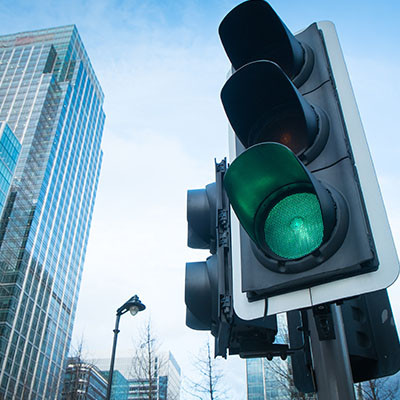Cambium Data Blog
AI Fuels the Technology to Make Traffic Lights More Environmentally Friendly
AI might feel like a technology perfectly at home in the world of science fiction, but the truth is that most of its uses are not nearly as interesting or fun. Take, for example, Operation Green Light, an initiative from Google that aims to better society through examining AI for traffic control and its impact on the environment.
How Much Time Do You Lose at Traffic Lights?
Traffic lights allow people to go about their day-to-day with relative safety, but they do also cause certain inconveniences, particularly where red lights are concerned. Consider how much time you spend waiting at a traffic light. All things considered, it’s likely somewhere between two weeks to half a year over the duration of your lifetime. During this time, your vehicle is emitting all kinds of gross stuff into the air.
One study, conducted back in 2015, showed that particle number concentrations—the number of nanoparticles in the air, like those produced by burning fuel—were 29 times more concentrated at intersections than elsewhere on the road, and that 25% of a commuter’s exposure to pollutants during their drive was accumulated at stoplights. Around half of the emissions produced at intersections come from this stop-and-go traffic.
Not only are stoplights bad for your patience, but they are also bad for drivers and the environment.
Google Wants to Change This
There are several options out there to reduce emissions, like greener fuels and more efficient technologies, but another one is to optimize how traffic control infrastructure actually directs traffic. Google has been working with its Green Light initiative to do just that. The initiative uses AI to collect data and analyze trends from Google Maps, and city engineers can use this information to adjust various intersections to more precisely direct the flow of traffic.
Green Light does not need any additional technology, allowing city engineers to make adjustments in as little as five minutes, according to Google. Google simply takes the data, runs it through their models, and provides its recommendations to cities that can then make adjustments according to these suggestions.
Google initially offered this program in Seattle, then expanded Green Light to cities all over the world, assisting drivers at 70 busy intersections across Abu Dhabi, Bali, Bangalore, Budapest, Haifa, Hamburg, Hyderabad, Jakarta, Kolkata, Manchester, and Rio de Janeiro. Trials suggest that there has been a 10% decrease in emissions, as well as 30% fewer stops made.
AI Can Solve Problems for Your Business Too
Through automation, AI can accomplish amazing things, especially for small and medium-sized businesses. It can help you analyze data, identify trends, address operational inefficiencies, and so much more. We can help you consider the possibilities today. To learn more, call us at (402) 514-3200.


Comments